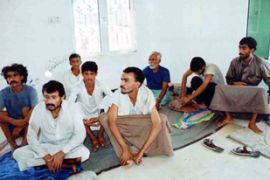Yemen offers conditional ceasefire
Fighters ready to meet the government’s demands if convinced about truce commitment.

It indicated that the ceasefire would begin on Saturday, and repeated demands by the government that the fighters return territory under their control and submit to central government authority.
The Houthi fighters, who are led by Abdul-Malek al-Houthi, are concentrated mainly in the Saada and Amran provinces.
They are known as Houthis after their late leader, Abdul-Malek’s brother Hussein Badr Eddin al-Houthi, a Zaidi leader who was killed by the Yemeni army in September 2004.
An offshoot of Shia Islam, the Zaidis are a minority in mainly Sunni Yemen but form the majority in the north.
Houthis’ reaction
Muhammad Abdulsalam, a spokesman for the Houthis, said they were willing to comply with the government’s five conditions if the government was seriously committed to the truce.
Speaking to Al Jazeera, he said “we are ready to examine them, and that is natural”.
| In depth | |||||||
|
Abdulsalam said the group had already made known its “commitment to a return to the situation as it was – opening roads, pulling out of our positions and the return of the local authorities.
“We do not wish to keep holding our detainees despite the fact that those in power are holding on to their prisoners, in some cases for more than four years”.
The Yemeni government says the fighters want to restore a Shia imamate that fell in the 1960s.
The Houthis say they want autonomy and accuse President Ali Abdallah Saleh of despotism and corruption in his quest to stay in power.
UN aid agencies say around 150,000 people have been made refugees since the fighting first began in 2004.
Thousands are staying in tented camps in mountainous territory and the agencies launched an appeal in Geneva last month for $23.5 million to help Yemen.
Civilians’ plight
In the most recent fighting, the army carried out three air raids and blew up houses in Saada city – under government control – on Friday.
About 87 people died on Wednesday in an air raid at a makeshift camp for displaced persons in Harf Sufyan in Saada.
Navi Pillay, the chief of the UN human rights commission, said in Geneva that an inquiry into the air raid should take place and called the casualty reports “deeply disturbing”.
The rights body called on Yemen to investigate the air attack.
A separate statement released by Ban’s office said “the [UN] secretary-general is deeply concerned about reports of recent air strikes during the course of military operations in the north of Yemen and the reported civilian casualties resulting from this”.
